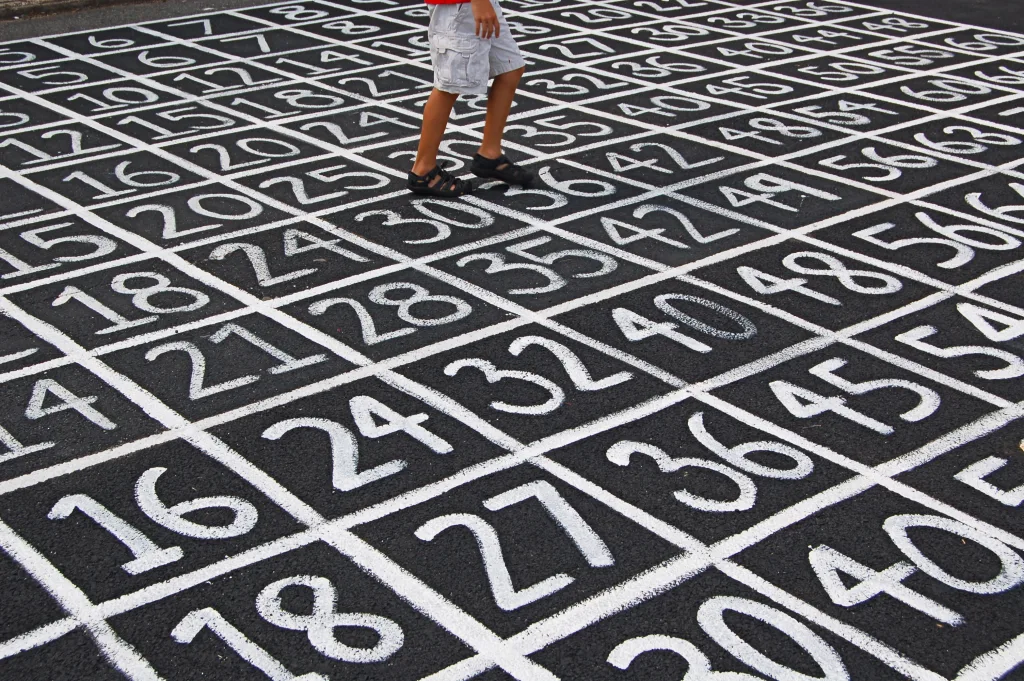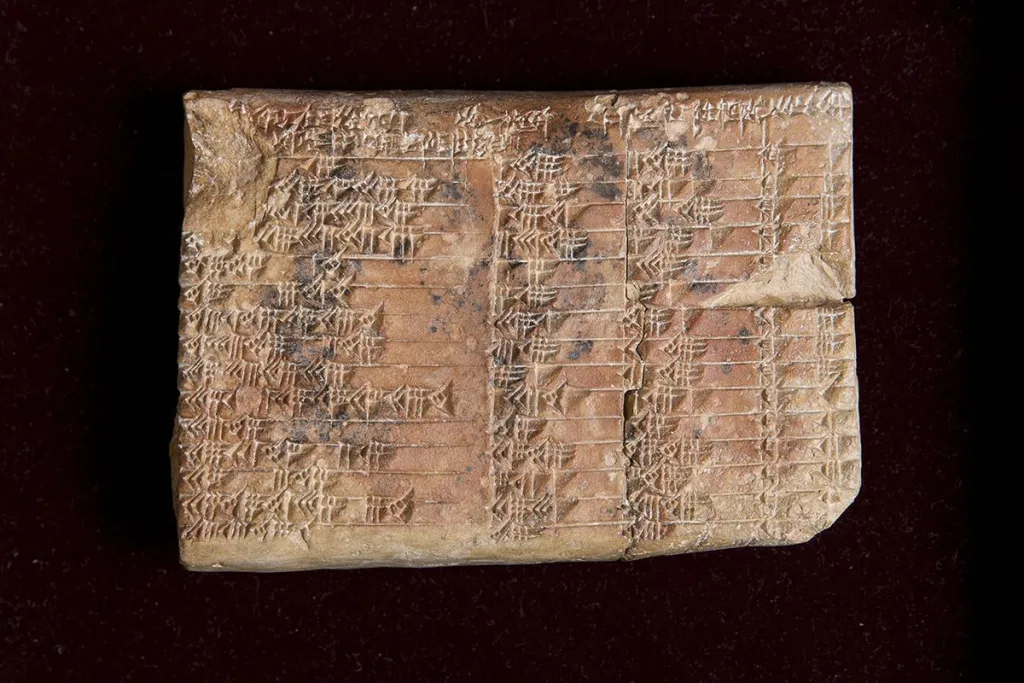Numbers are an integral part of our everyday lives. We use them to count, measure, and quantify the world around us. But have you ever wondered who invented numbers? The origins of numbers can be traced back to ancient civilizations, specifically to the Egyptians and Babylonians.
The Egyptians were one of the first civilizations to develop a system for counting and recording numbers. They utilized different symbols to represent different numbers. For instance, a single line symbolized the number one, while a rope symbolized the number ten. To represent a hundred, they used a coil of rope. This system allowed them to perform basic arithmetic operations.
However, it was the Babylonians who truly advanced the concept of numbers. Around 4,000 B.C., in the region of Sumeria (present-day southern Iraq), the Babylonians developed a comprehensive system for arithmetic. This civilization, known for its trade and commerce, needed more sophisticated methods of counting and record-keeping.
The Babylonians used a base-60 number system, known as the sexagesimal system, which is still reflected in our modern measurement of time (60 seconds in a minute, 60 minutes in an hour). They had symbols for all the digits from 1 to 59, represented by a combination of two basic symbols. For example, the number 23 was represented by combining the symbol for 20 with the symbol for 3.
Around the 6th or 7th century, Hindu-Arabic numerals were developed in India. These numerals, which are the ones we use today, consist of ten symbols: 1, 2, 3, 4, 5, 6, 7, 8, 9, and 0. They were introduced to Europe through the writings of Middle Eastern mathematicians, particularly al-Khwarizmi and al-Kindi, around the 12th century.
The Hindu-Arabic numeral system revolutionized mathematics and made complex calculations much easier. It introduced the concept of the zero, which was a significant advancement. The zero acted as a placeholder and allowed for the representation of larger numbers. Additionally, the decimal system, based on powers of ten, simplified arithmetic operations and made calculations more efficient.
The concept of numbers has evolved over thousands of years, starting with the Egyptians and Babylonians. These ancient civilizations laid the foundation for our modern numerical systems. The Hindu-Arabic numerals, introduced to Europe in the Middle Ages, transformed mathematics and revolutionized the way we count and calculate. Numbers are an essential part of our lives, and their invention has had a profound impact on human civilization.
Who Invented Numbers 1 To 9?
The Hindu-Arabic numerals, which include the numbers 1 to 9, were not invented by a single individual. Instead, they evolved over time through the contributions of various cultures and mathematicians. However, the origins of these numerals can be traced back to ancient India.
The numeral system we use today, known as the decimal system, was developed in India during the 6th or 7th century. The people of ancient India made significant advancements in mathematics, including the concept of zero, which played a crucial role in the development of the numeral system.
The Hindu-Arabic numerals were introduced to Europe through the writings of Middle Eastern mathematicians, particularly al-Khwarizmi and al-Kindi, around the 12th century. These mathematicians translated and spread Indian mathematical knowledge, including the use of these numerals, to the Western world.
To provide a more detailed explanation, here are some key points regarding the evolution of the Hindu-Arabic numerals:
1. Ancient India: Indian mathematicians developed a decimal system, which included the numbers 1 to 9, during the 6th or 7th century. The concept of zero, a placeholder for an empty value, was also introduced.
2. Middle Eastern Influence: The numeral system, along with other mathematical concepts, was transmitted to the Middle East. Mathematicians like al-Khwarizmi and al-Kindi played a crucial role in translating and spreading Indian mathematical knowledge.
3. Introduction to Europe: The Hindu-Arabic numerals were introduced to Europe through the works of Middle Eastern mathematicians. These numerals gradually replaced the existing Roman numeral system in Europe due to their simplicity and efficiency in mathematical calculations.
4. Wide Adoption: The Hindu-Arabic numerals gained widespread acceptance in Europe during the Renaissance period. They were embraced by mathematicians, scientists, and merchants, eventually becoming the standard numeral system used worldwide.
It is important to note that while the Hindu-Arabic numerals were not invented by a specific individual, the contributions of various cultures and mathematicians over centuries led to their development and widespread adoption.

Who Invented Numbers And Why?
The invention of numbers cannot be attributed to a single individual or civilization as it developed over thousands of years across different cultures. However, the ancient Egyptians are often credited with being the first civilization to develop a numerical system and assign symbols to represent different numbers.
The Egyptians recognized the need for a system to count and keep track of quantities, especially for administrative and trading purposes. They devised a numerical system using different symbols to represent numbers and developed a hieroglyphic writing system to record these symbols. This early numerical system was based on a decimal system, meaning it used a base of 10.
The Egyptians started with a simple symbol for one, which was just a single line. As they needed to represent larger quantities, they devised symbols for multiples of ten and one hundred. The symbol for ten was a rope, while a coil of rope represented a hundred. These symbols allowed the Egyptians to express numbers by combining the appropriate symbols in a similar way to how we use digits today.
The development of a numerical system by the Egyptians was a significant milestone in human history as it enabled the recording and manipulation of quantities. This laid the foundation for various mathematical concepts, such as addition, subtraction, and multiplication, which were crucial for the advancement of fields like engineering, architecture, and astronomy.
While the exact reasons behind the invention of numbers are not fully known, the Egyptians were among the first to recognize the importance of a numerical system and developed symbols to represent different quantities. This early numerical system played a crucial role in facilitating trade, administration, and the development of subsequent mathematical concepts.
Who Invented Number In Math?
The invention of numbers in mathematics cannot be attributed to a single individual. Instead, the concept of numbers evolved over time through the contributions of various ancient civilizations.
1. Egyptians: The ancient Egyptians developed a numeral system around 3000 BCE. They used hieroglyphics to represent numbers, with different symbols representing powers of 10. This system allowed them to perform basic arithmetic operations.
2. Babylonians: The Babylonians, around 1800 BCE, developed a more sophisticated number system known as sexagesimal, based on the number 60. They used a combination of symbols to represent different values, enabling them to perform complex calculations.
3. Greeks: The ancient Greeks made significant contributions to the mathematical concept of numbers. Pythagoras, in the 6th century BCE, introduced the idea of irrational numbers, which cannot be expressed as fractions. Euclid, in his book “Elements,” laid the foundation for axiomatic number theory.
4. Indians: Indian mathematicians, particularly during the Gupta period (4th to 6th century CE), developed the decimal system. They introduced the concept of zero as a placeholder and pioneered the use of positional notation, which greatly facilitated arithmetic operations.
5. Arabs: The Arab mathematician Al-Khwarizmi, in the 9th century CE, further refined the decimal system and introduced Hindu-Arabic numerals, which are still used today. His work on algebra also had a profound influence on the development of numbers and mathematical notation.
It is important to note that the concept of numbers and their development was a collective effort over many centuries and across multiple civilizations. Each civilization built upon the knowledge and techniques of their predecessors, gradually shaping the mathematics we know today.
When Did Numbers Get Invented?
Numbers were invented around 4,000 B.C. in Sumeria, a civilization located in southern Mesopotamia, which is now southern Iraq. This ancient civilization was known for its advanced cities that were centers of trade and commerce. As the Sumerians engaged in various economic activities, they needed a method to count and keep records. This led to the development of numbers and counting systems. Here is some additional information about the invention of numbers:
1. Sumerian Numerals: The Sumerians used a base-60 system, also known as sexagesimal, to represent numbers. They developed a series of symbols to represent different quantities. These symbols were initially simple marks made on clay tablets, gradually evolving into more complex numerical signs.
2. Cuneiform Writing: The Sumerians used a writing system called cuneiform, which involved making wedge-shaped impressions on clay tablets. This system allowed them to keep written records of their numerical calculations, such as trade transactions and inventories.
3. Mathematical Tablets: Archaeologists have discovered numerous mathematical tablets from ancient Sumeria, which contain various mathematical calculations and problems. These tablets provide evidence of the Sumerians’ advanced understanding of arithmetic, geometry, and algebra.
4. Clay Tokens: Before the invention of written numbers, the Sumerians used clay tokens of different shapes to represent quantities. These tokens were kept in clay envelopes and served as a precursor to the written numerical system.
5. Influence on Later Civilizations: The Sumerian numerical system and counting methods greatly influenced other ancient civilizations, such as the Babylonians and Egyptians. Later civilizations built upon the foundation laid by the Sumerians, developing more sophisticated number systems and mathematical concepts.
Numbers were invented around 4,000 B.C. in Sumeria as a result of the need for counting and record-keeping in a rapidly growing civilization. The Sumerians developed a numerical system based on symbols and used clay tablets to keep written records of their calculations. This invention laid the groundwork for future mathematical advancements in other civilizations.

Conclusion
The invention of numbers is a complex and fascinating topic. While it is difficult to pinpoint a specific individual or civilization that can be credited with the invention of numbers, it is clear that the concept of counting and numerical representation has evolved over thousands of years.
The Egyptians were one of the first civilizations to develop symbols for different numbers, using simple lines and ropes to represent quantities. However, it was the Sumerians in Mesopotamia who truly expanded the concept of numbers by developing a complete system for arithmetic on the whole numbers and positive rational numbers.
The Hindu-Arabic numerals that we use today, which consist of the symbols 1, 2, 3, 4, 5, 6, 7, 8, 9, and 0, originated in India and were introduced to Europe through the writings of Middle Eastern mathematicians. These numerals revolutionized mathematics and made complex calculations much easier.
The invention of numbers is a collective effort that spans across different cultures and civilizations. It is a testament to the human capacity for abstract thinking and the need for efficient methods of counting and record-keeping. While we may never know the exact origins of numbers, their importance in our daily lives cannot be overstated.
